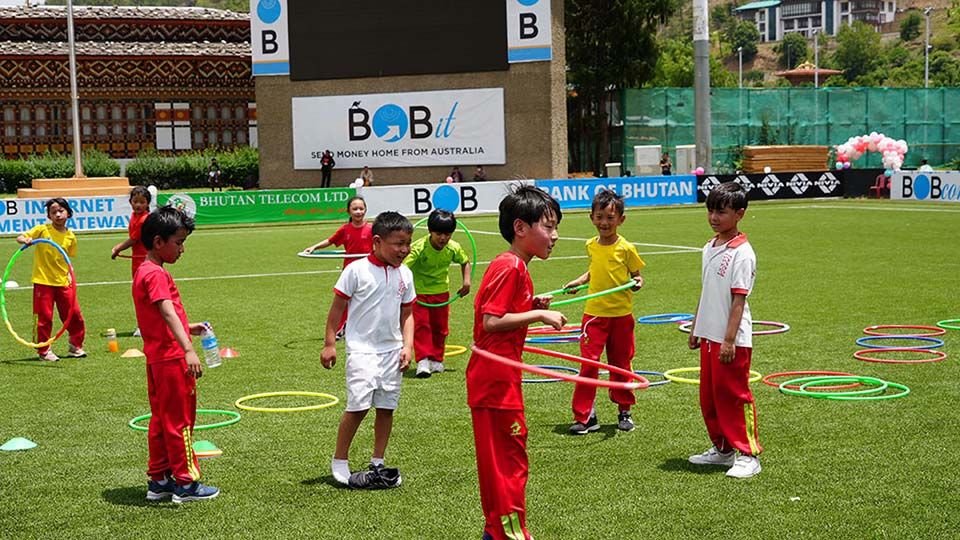June 14, 2024
THIMPHU – Dressed in red, blue, yellow, green, pink, and black, forming a spectrum of colours, over 300 students from schools in Thimphu attended the International Day of Play at the Changlimithang stadium yesterday.
Neatly dressed in Thimphu City football club attire, Pelden Chhoying Wangyel stands out, with Nike socks and chubby little red cheeks.
A student of Chang Rigphel Primary School, Pelden Chhoying Wangyel, has come to participate in the Day proudly wearing his brother’s attire. He is a fan of Chencho Gyeltshen, a Bhutanese football icon (CG7).
Yesterday’s play event marked the initiation of the programme globally. June 11 will be observed as the International Day of Play (IDP), aimed at highlighting the need for play as a part of the learning curriculum for children.
A student of Zilukha MSS, Samten Dema, said that such events are an integral part of a happy, safe, healthy, and nurtured childhood. “Such events should be carried out in a big manner.”
Education ministry as the apex body should focus on framing enabling policies and programmes that are attractive for schools to take up, she added. “Dedicating a period for health and physical education (HPE) in a week is inadequate.”
There are various agencies working individually in such areas. Integration of these agencies can help in pooling resources and funds to bring expected changes in the existing infrastructures and add the required facilities.
Many seem to think so.
Opportunities, Samten Dema said, should be made available equally for all. “Today, just a handful of us are here. Providing equal opportunities to everyone, including the ones who are less privileged and have not had opportunities should be prioritised.”
Pema Namgay, 37, closed his shop today to participate in the event along with his son.
“As Bhutan embarks on achieving wholesome education for the students, making it vibrant and fun is important,” he said.
“Not having enough infrastructure is not an issue, but taking ownership and maintaining them is an issue,” Pema Namgay said. “Over the years, from one national stadium with artificial turf to having artificial turf across the country is a remarkable achievement. However, addressing the lapses like timing, supports, and making good use of the resources is a major problem.”
Pema Namgay’s son usually does not attend outdoor sports and is mostly engaged with electronic gadgets.
But today, he could see his son enjoying it along with friends. “Such initiatives will curb the rising issues of internet addiction and concerns of substance abuse in the country, if it is taken well by all the parents.”
Play is important, Pema Namgay said, not only for earning a living, but for the overall well-being of the children also. “Back in days, teachers and parents used to stigmatise that games and sports are not going to help in earning a living. Today, the nation is growing with exemplary sports icons. This has also helped in changing the mindsets of our people.”
Global data shows that approximately four in 10 children aged between two and four years do not get enough responsive interaction or stimulation at home. Moreover, around one in five children aged between two and four years do not play with their caregivers at home.
Play is undervalued and trivialised, opportunities for play are being squeezed out of childhood, and a high number of children are deprived of play at home.
Acknowledging the lapses faced across the nation, the chief sports co-ordinator at the department of education programme, MoESD, Nima Gyeltshen, said that the department had proposed to work on these shortages in the 13th Plan.
“MoESD and UNICEF Bhutan are marking this day focussed towards young children which are age-specific and interesting,” he said. “The schools across the country have had HPE classes and sports events for a long time now.”
According to Nima, budget constraints, facilities and infrastructure, are some of the current problems. “Working on these, is our priority ahead.”
Specialist at early childhood care and development (ECCD), MoESD, Karma Gayleg, said that the understanding of play and its need was being re-looked and emphasised over time.
“Children are into electronic gadgets from a young age. Over time, children fall victim to substance abuse and alcohol,” he said. “While there are several agencies focussed on children, integration into collaborative actions is minimal. Including fun activities in learning and working collaboratively can bring desirable outcomes.”
The representative of UNICEF Bhutan, Andrea James, said that play in its various forms played a crucial role in fostering physical, social, emotional, and cognitive development, especially in children.
“It is an opportunity for us to strengthen policies, training, and funding to get play integrated into education and community settings worldwide,” Andrea James said.
“Now more than ever, we will need to work together towards the creation of safe spaces at homes, in schools and communities so that children can explore, imagine and connect through play,” she said. “Given the risks associated with prolonged screen time on children’s wellbeing, UNICEF urges parents and caregivers to replace this with engaging activities that strengthen the bond between parents and children.”
Students, including children from ECCD centres, participated in the national event where various health and physical education sessions were organised by School Sports Instructors.
All 442 ECCD centres across the country celebrated the day in their own style.
In 2013, the UN Committee on the Rights of the Child (CRC) issued a general comment on the right of the child to play. ON March 25, the UN General Assembly adopted a resolution to create an IDP with more than 140 countries as co-sponsors.
Article 31 of the CRC recognises the right of every child to rest, leisure, play, recreational activities and free and full participation in cultural and artistic life.
The MoESD in partnership with UNICEF Bhutan observed the day which was attended by Lyonpo Yeezang De Thapa.


